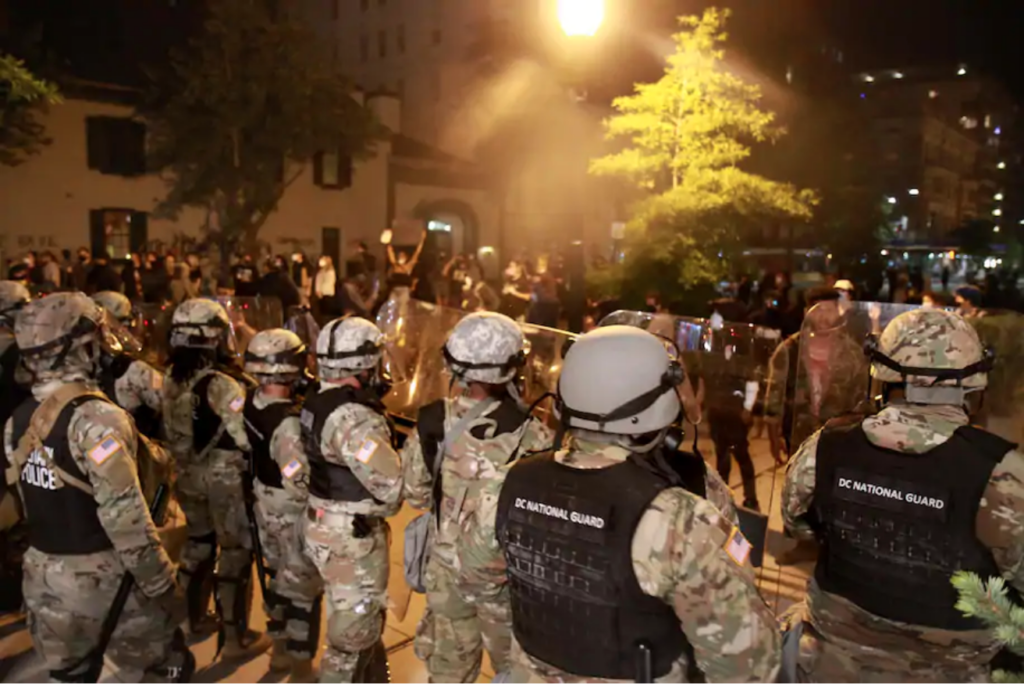
by Shane Harris
via The Washington Post
A group of lawyers is offering advice to military and National Guard members who worry they may be given unlawful orders if deployed during protests or disputes over next month’s elections.
The Orders Project was formed in response to the use of force against protesters this summer in Lafayette Square, two of the founders said in an interview Friday.
The protests, which followed the death of George Floyd in police custody in Minneapolis, prompted confusion among law enforcement and National Guard leaders. Some officials said they had no warning that the U.S. Park Police, which commanded the operation, planned to move against protesters and that the crowd could have been moved out of the area without the use of force.
The legal group anticipates that military personnel might find themselves in the same position this fall, and they may question whether orders they receive are legal.
Some of the scenarios the lawyers have imagined are rooted in recent history with this year’s protests. But President Trump has also raised the prospect of unprecedented legal challenges. For instance, the lawyers say he could federalize the National Guard and order members to seize disputed ballots. Trump has repeatedly claimed, without evidence, that mail-in ballots, expected to be cast in historic numbers, are rife with fraud and could imperil his reelection chances.
“Military personnel don’t have to follow an unlawful order, but they take a risk when deciding not to,” said Eugene R. Fidell, one of the country’s leading experts on military law and an Orders Project co-founder.
Fidell advised concerned personnel to consult first with lawyers in their chain of command and to seek out the group as a kind of backup, if they want another opinion. The volunteer attorneys are all experts on the Uniform Code of Military Justice and will consult with service members on a case-by-case basis.AD
The group hopes to provide “a guide for the perplexed,” Fidell said, and has compiled a legal sourcebook for military personnel as well as lawyers.
Not only are service members not required to follow illegal orders, they are required not to obey “flagrantly unlawful” ones, said Michel Paradis, a professor of military law at Columbia Law School, who is not involved in the Orders Project.
But in reality, those who refuse take enormous risks.
Military law “makes disobedience to an order itself a criminal offense,” Paradis said. He explained that disputes are typically settled informally within the chain of command. Military lawyers can also help resolve disagreements. In more extreme cases, a service member who believes an order is unlawful can report the matter to an inspector general.
But those who choose to go outside those traditional processes will find little guidance.AD
“The lack of clarity should be emphasized here — we didn’t find any military case law where the issue of obedience to orders was litigated in a context where personnel were deployed domestically,” said Brenner Fissell, an associate professor of law at Hofstra University and an Orders Group co-founder.
Fidell said this summer’s protests, as well as the president’s refusal to commit to a peaceful transfer of power should he lose, have convinced the group that military personnel could use extra counsel.
Soldiers might be given orders to open fire at protesters, Fidell said, recalling the killing of four unarmed Kent State University students by Ohio National Guard members during a Vietnam War protest in 1970. And unprecedented legal questions could arise if the election is still in dispute come Inauguration Day but Trump continues to give orders to the military.
“We hope they’ll never happen,” Fidell said of such nightmare scenarios. “But it’s unrealistic to think these are out of the question.”
Filed in: Alumni Profiles
Tags: Black Lives Matters, Eugene R. Fidell, National Guard, Orders Project
Contact Office of Clinical and Pro Bono Programs
Website:
hls.harvard.edu/clinics
Email:
clinical@law.harvard.edu